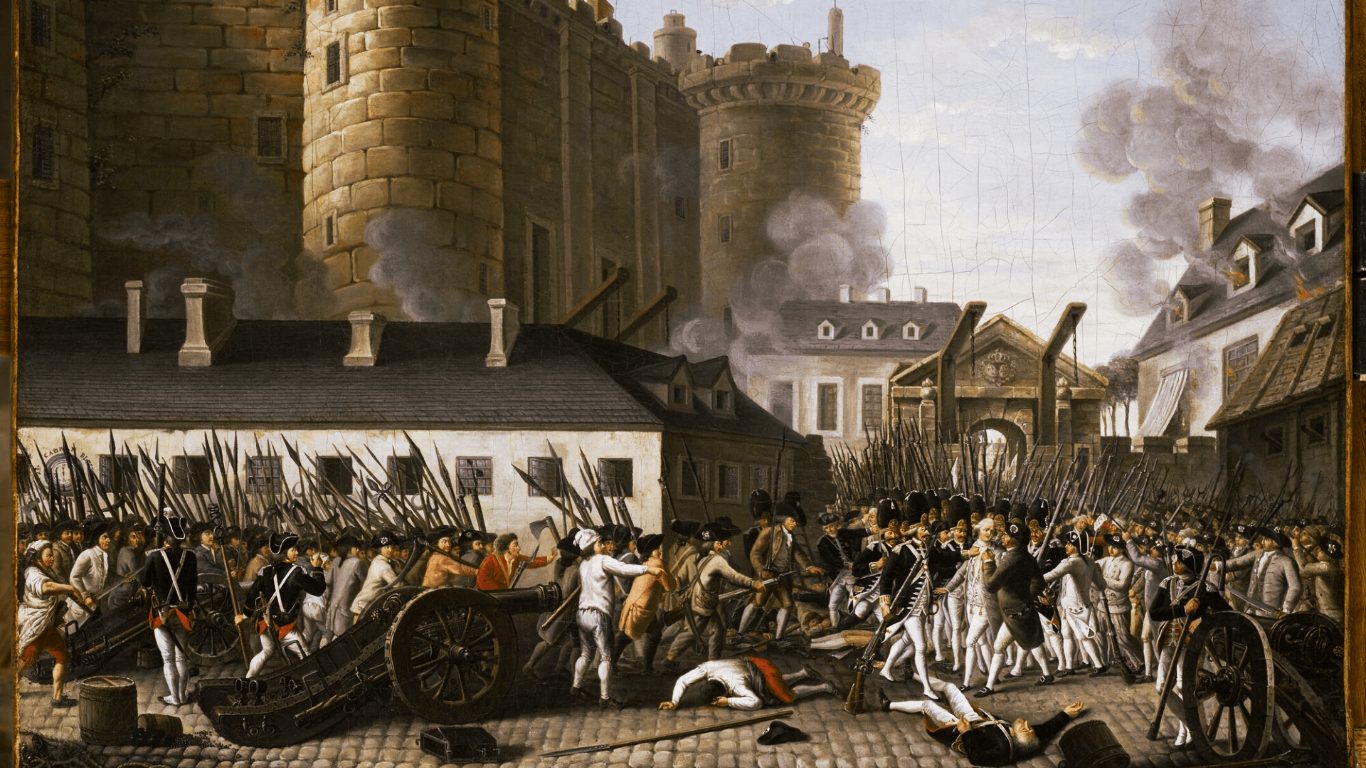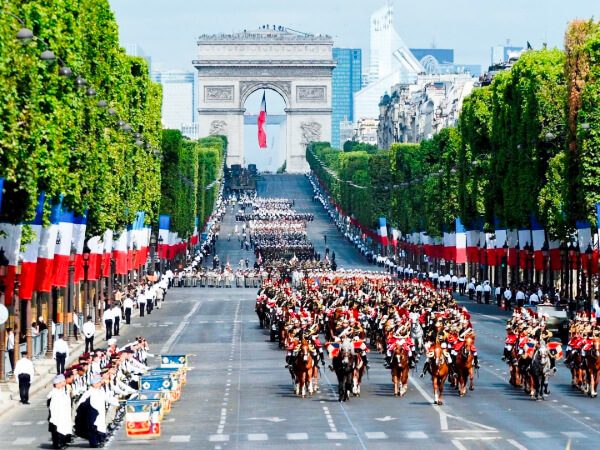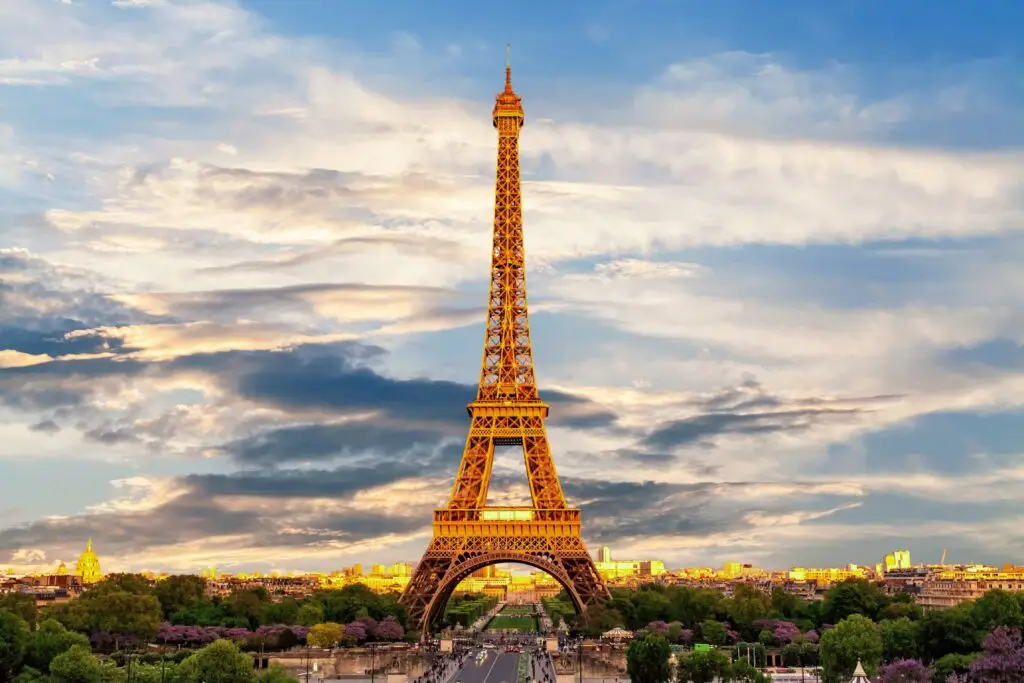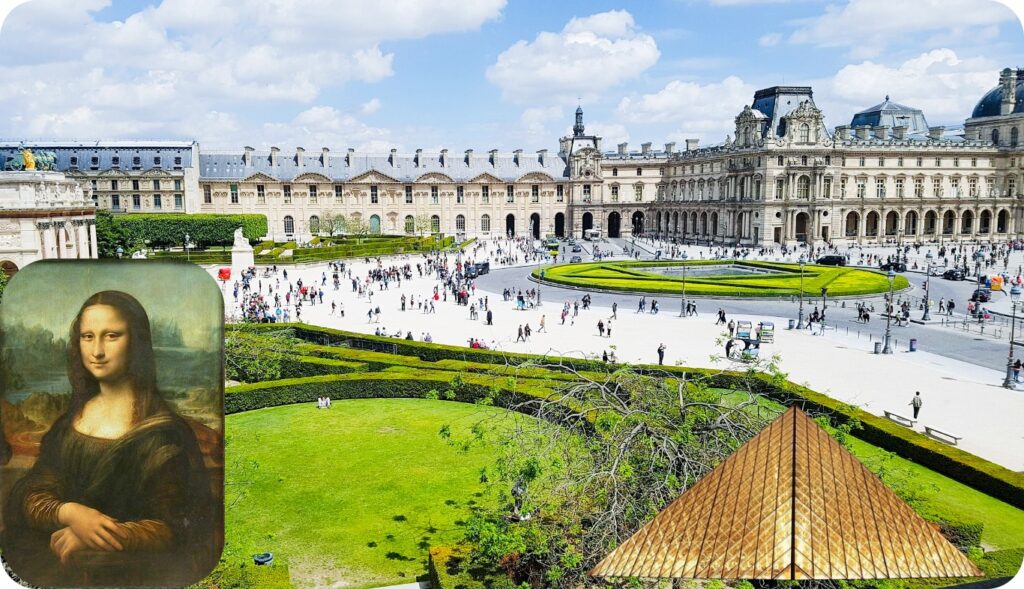Bastille Day:
France's Historic Revolution
Discover the story of Bastille Day—where revolution sparked, liberty bloomed, and France changed forever.


Introduction
Bastille Day, celebrated every July 14 in France, stands as a powerful symbol of liberty, unity, and the enduring spirit of the French people. Known in France as “14 Juillet Fête Nationale”, this national holiday marks the turning point in French history—the storming of the Bastille prison in 1789. More than just a historic uprising, Bastille Day represents the birth of the modern French Republic and the principles of liberté, égalité, fraternité.
Across cities and villages, French National Day comes alive with dazzling military parades, communal feasts, fireworks, and festive concerts. In Paris, the Champs-Élysées hosts the world’s oldest and largest military parade, showcasing national pride and heritage. But the significance of Bastille Day extends far beyond celebration—it reminds the world of the people’s power to transform history.
For many, July 14 is not just a date but a cultural cornerstone, reflecting France’s evolution from monarchy to democracy. Today, Bastille Day remains a heartfelt tribute to the ideals that shaped the nation and continue to guide its identity.
In this ultimate guide, we’ll explore the full history of July 14 France, from its revolutionary roots to its modern-day impact—uncovering why Bastille Day is much more than a holiday; it’s a legacy of freedom.
From Monarchy to Revolution: The Origins of Bastille Day
To truly grasp the meaning of Bastille Day, or 14 Juillet Fête Nationale, we must look back at the complex social and political landscape of 18th-century France. By the 1780s, France was a kingdom in crisis. The monarchy, led by King Louis XVI, faced mounting debts, widespread famine, and a population growing restless under absolute rule.
While the nobility and clergy enjoyed privileges, the Third Estate—ordinary citizens—bore the tax burden. Inspired by the Enlightenment and recent events like the American Revolution, calls for reform echoed through salons and city streets. The situation escalated in 1789, when the king convened the Estates-General, a gathering of representatives from all classes, for the first time in 175 years.
When talks failed and royal forces began to mobilize, panic gripped Paris. Rumors of a crackdown spurred citizens into action. They sought arms, then gunpowder—stored at the Bastille, a medieval fortress that had come to symbolize tyranny and oppression.
Though only housing seven prisoners, the Bastille was a powerful political symbol. On July 14, 1789, Parisians stormed it—not to free inmates, but to resist tyranny and defend the cause of liberty. It became the spark that ignited the French Revolution.
This act, now commemorated on Bastille Day, marked the beginning of a national awakening. The fall of the Bastille became a global emblem of rebellion, defiance, and the possibility of change. French National Day was later born from this powerful moment—a reminder that the people’s voice can shape the future.
The Storming of the Bastille – July 14, 1789
Bastille Day, now celebrated with fireworks and parades, began with a violent yet symbolic act: the storming of the Bastille prison on July 14, 1789. This moment became the heart of what we now call the French National Day, and it didn’t happen by accident—it was a buildup of desperation, defiance, and revolutionary energy.
Paris, in mid-July, was a city on edge. Bread prices had skyrocketed, the people were hungry, and the king’s dismissal of the popular finance minister Jacques Necker had enraged citizens. Rumors spread that the king would crush dissent with military force. The revolutionaries knew they needed weapons to defend themselves.
On the morning of July 14, a crowd of Parisian workers, artisans, and revolutionaries seized rifles from the Hôtel des Invalides. But they lacked gunpowder—stored inside the Bastille. By the afternoon, a mob had gathered outside the fortress. After tense negotiations failed, the crowd broke in with the help of sympathetic guards.
After hours of chaos, the Bastille’s governor, Bernard-René de Launay, surrendered. The angry mob dragged him through the streets before executing him. Though only seven prisoners were freed, the symbolism was enormous. The people had risen against royal tyranny.
The Storming of the Bastille didn’t just tear down a prison—it shattered the illusion of royal invincibility. For revolutionaries across France, it was a rallying cry. For the monarchy, it was the beginning of the end.
Today, this defining act is why Bastille Day is more than a date—it’s a celebration of courage, unity, and resistance. It marks the turning point when ordinary citizens seized their place in history and demanded change—a moment that would echo across centuries and continents.
The Fall of the Monarchy and Rise of the Republic
Following the storming of the Bastille, the French Revolution entered a turbulent and transformative phase. The monarchy that had ruled France for centuries began to crumble, making way for a new political era. The revolution was no longer about reforms—it was about complete transformation.
In the months after July 14, 1789, the National Constituent Assembly worked to draft a new constitution that would limit the king’s power. Meanwhile, revolutionary fervor grew across the country. The Declaration of the Rights of Man and of the Citizen, passed in August 1789, laid the ideological foundation for a republic—highlighting liberty, equality, and fraternity.
However, King Louis XVI resisted these changes. His attempt to flee France with his family in 1791—known as the Flight to Varennes—destroyed any remaining trust the people had in him. It confirmed suspicions that the monarchy could not coexist with the goals of the revolution.
By August 1792, the monarchy had lost all authority. The storming of the Tuileries Palace and the imprisonment of the royal family marked the end of the Ancien Régime’s grip on power. One month later, on September 21, 1792, the National Convention abolished the monarchy and proclaimed the First French Republic.
The execution of King Louis XVI on January 21, 1793, and later Queen Marie Antoinette, sent shockwaves through Europe. Monarchies across the continent feared the revolutionary wave might spread.
The 14 Juillet Fête Nationale, when observed today, honors this seismic shift in governance—from absolute monarchy to a democratic republic. It reminds citizens of the values won through struggle and sacrifice. The day reflects French culture, not just in celebration but in its historical resolve to stand for freedom and self-rule.
The French Revolution’s Global Impact
The 14 Juillet Fête Nationale marks more than just a turning point in French history—it also ignited a chain reaction across the globe. The ideals that emerged from the French Revolution—liberty, equality, fraternity—transcended borders and inspired generations worldwide.
At its core, the Revolution rejected absolute monarchy and championed democratic governance. This message resonated deeply in other nations struggling with autocracy or colonial oppression. For instance, in Europe, countries like Italy, Germany, and Poland experienced nationalist and liberal uprisings in the 19th century that were directly influenced by French revolutionary principles. Even the Haitian Revolution (1791–1804), the only successful slave revolt in modern history, drew both ideological and tactical inspiration from events in France.
Across the Atlantic, early American revolutionaries found common cause with the French people. Though the American Revolution predates Bastille Day, the exchange of revolutionary ideals helped solidify a strong bond between the two countries. In later years, French revolutionary influence would be seen in independence movements across Latin America, Asia, and Africa.
Culturally, the revolution gave rise to a wave of political literature, music, and art that reflected the new spirit of resistance and civil rights. The holiday of 14 Juillet Fête Nationale became a global symbol of civil freedom. Its celebration isn’t just limited to France—many Francophone countries and French communities worldwide hold their own versions of Bastille Day, commemorating the dawn of citizen power.
In today’s interconnected world, the French National Day continues to stand as a beacon for those fighting against tyranny. It’s a reminder that courage, when fueled by the quest for justice, can reshape history.
The global influence of the French Revolution gives 14 July a powerful legacy, turning this national celebration into a timeless symbol of liberty across the world.
How 14 Juillet Became a National Holiday
Though the storming of the Bastille occurred on 14 July 1789, it wasn’t immediately established as an official holiday. In fact, the road from revolution to national celebration was a long and politically complex one. The modern 14 Juillet Fête Nationale as we know it today was born from a desire to unify the French people around shared values and history.
The first official celebration actually took place one year after the Bastille’s fall—on 14 July 1790, during the Fête de la Fédération. Held on the Champ de Mars in Paris, this massive event celebrated national unity and the constitutional monarchy. It featured a military parade, oaths of loyalty to the nation, and public festivities—a clear precursor to today’s celebrations. Yet, the violent course of the Revolution soon eclipsed such optimism.
Throughout the 19th century, different regimes in France either ignored or repressed revolutionary commemorations. Monarchies and empires had little interest in glorifying events that toppled kings. However, the fall of the Second Empire in 1870 and the rise of the Third Republic set the stage for Bastille Day’s revival.
In 1880, a pivotal law was passed declaring 14 July the official French National Day (Fête Nationale). There was significant debate in Parliament—some argued for 14 July 1790 (symbol of unity) rather than 1789 (symbol of revolt). Ultimately, lawmakers deliberately left the year ambiguous, cleverly referencing both events to satisfy both republicans and moderates.
Since then, the 14 Juillet Fête Nationale has become a defining expression of French culture and identity, with annual parades, fireworks, and patriotic pride.
By institutionalizing the day, France not only honored its revolutionary roots but also forged a tradition that continues to bring people together in celebration of freedom and fraternity.
National Traditions and Festivities on 14 Juillet
Every year on 14 July, France bursts into color, music, and patriotic pride. The 14 Juillet Fête Nationale is a unifying moment for the French people, blending historical remembrance with festive celebration. From grand cities to quiet villages, the day is marked with a range of traditions that reflect both French culture and regional flair.
🇫🇷 The Paris Military Parade
The most iconic celebration takes place in Paris with the Champs-Élysées Military Parade—the oldest and largest regular military parade in Europe. Since 1880, it has honored the armed forces, national pride, and unity. French troops march alongside military units from allied countries, accompanied by aircraft flyovers, tanks, and ceremonial pageantry. The President of France oversees the event, which is broadcast live to millions.
🎇 Fireworks and Light Shows
As night falls, cities across the country light up the sky with dazzling fireworks. Paris hosts a breathtaking display near the Eiffel Tower, usually choreographed to classical or contemporary music. From Marseille’s port to Lyon’s riverside, every display adds a unique local twist to this shared national moment.
💃 Bals des Pompiers – The Fireman’s Ball
In towns and neighborhoods, the traditional Bals des Pompiers (Firemen’s Balls) bring communities together with dancing, music, and food. Fire stations open their doors to the public, transforming into party venues. It’s one of the most beloved aspects of French daily life on 14 Juillet, mixing fun with a spirit of gratitude toward local heroes.
🥐 Feasting and Family
Food is central to the celebration. Families gather for outdoor meals, picnics, and barbecues. Regional dishes and French cuisine classics—like charcuterie, tarts, and wine—make an appearance on every table.
From solemn remembrance to joyous revelry, 14 Juillet Fête Nationale represents the enduring food and lifestyle of France, where tradition and modern celebration meet in perfect harmony.
14 Juillet Celebrations in French Regions
While Paris commands global attention on 14 Juillet Fête Nationale, the heart of French National Day beats just as strongly across its diverse regions. Each French region contributes its own traditions, customs, and personality to the celebration—bringing the country’s unity through cultural variety to life.
🏰 Provence-Alpes-Côte d’Azur
In Nice, 14 Juillet is celebrated with beachside concerts, fireworks over the Mediterranean, and a special tribute to the victims of the 2016 tragedy. Towns like Aix-en-Provence host classical music festivals and open-air theatre events, combining patriotism with artistic expression—a true reflection of French culture.
🗻 Auvergne-Rhône-Alpes
Lyon puts on spectacular fireworks shows over the Fourvière hill. The historic city offers public dances and local food stalls showcasing regional cuisine like quenelles and saucisson. Mountain villages celebrate more intimately with torch-lit processions and folk music, keeping centuries-old traditions alive.
🏞️ Brittany and Normandy
In the northwest, Normandy honors both Bastille Day and its role in WWII liberation. Flag-waving parades and flyovers are common. In Brittany, coastal towns like Saint-Malo celebrate with maritime processions, Breton dancing, and seafood feasts—a vivid fusion of French daily life and regional pride.
🍇 Nouvelle-Aquitaine
Bordeaux celebrates with wine-themed events, open-air concerts, and dazzling riverfront fireworks. Rural towns emphasize community gatherings and farmers’ markets—highlighting the food and lifestyle of France in its most authentic form.
🌻 Occitanie & Languedoc
Known for its medieval heritage, Carcassonne stages one of France’s most impressive fireworks shows, illuminating its UNESCO-listed citadel. Villages host pétanque tournaments, accordion music, and communal dinners under strings of lights.
🏙️ From Alsace to Corsica
In Alsace, 14 Juillet is celebrated with a mix of French and German influences, while Corsica showcases patriotism with traditional Corsican songs, dramatic parades, and regional delicacies.
Across every region, 14 Juillet Fête Nationale brings together history, identity, and joy—proving that Bastille Day is not just a Parisian affair, but a deeply rooted celebration across the fabric of France.
Bastille Day Around the World
While the 14 Juillet Fête Nationale is deeply rooted in French soil, its influence spans continents. As France’s National Day, Bastille Day is celebrated not only by French citizens abroad but also by global admirers of French culture, freedom, and revolutionary ideals. From New York to New Delhi, the world joins in honoring the legacy of 1789.
🇺🇸 United States
In major cities like New York, Washington D.C., and San Francisco, French communities organize street fairs, wine tastings, and public dances reminiscent of Parisian bals populaires. The iconic “Bastille Day on 60th Street” festival in NYC transforms a Manhattan block into a lively market filled with French food, fashion, and live music.
🇨🇦 Canada
In Montreal, which has a significant Francophone population, Bastille Day is marked with concerts, Francophone film screenings, and family-friendly events. The city also hosts performances of French chansons, honoring both linguistic and cultural ties with France.
🇦🇺 Australia
Cities like Sydney and Melbourne see French expatriates and locals come together to celebrate with French wine festivals, cooking classes, and Eiffel Tower-themed décor. The Sydney French Festival in July often coincides with the National Day, creating a joyful Franco-Aussie fusion.
🇮🇳 India
In Pondicherry, once a French colony, 14 July is celebrated with marching parades, flag hoisting, and bilingual cultural programs. Locals and tourists enjoy crêpes, baguettes, and music blending Indian and French traditions.
🌐 Worldwide Impact
French embassies and consulates globally host elegant receptions featuring French cuisine, national anthems, and ceremonial speeches. The day becomes a diplomatic and cultural bridge, connecting France to the global community.
The worldwide embrace of 14 Juillet Fête Nationale illustrates how France’s revolutionary message of liberté, égalité, fraternité continues to inspire generations far beyond its borders.
Conclusion: The Spirit of July 14 Lives On
The 14 Juillet Fête Nationale is more than a commemoration of a historical event—it’s a living, breathing tribute to freedom, unity, and the enduring power of the people’s voice. What began as a rebellion against tyranny in 1789 has evolved into a celebration of national identity, democratic values, and cultural pride.
Today, July 14 serves as a powerful symbol not just for France, but for the world. It reminds us that the right to question authority, to demand justice, and to rebuild society from the ground up is fundamental. From the storming of the Bastille to the unity displayed at Fête de la Fédération, this holiday teaches that the true strength of a nation lies in the will of its people.
Across the globe, 14 Juillet Fête Nationale is recognized not just as a French holiday, but as a universal moment to reflect on freedom. Whether watching the military parade in Paris, dancing at a bal populaire, or enjoying a firework-lit sky, people of all backgrounds join in celebrating the spirit of revolution and renewal.
For the French, it is a day of pride and remembrance. For others, it offers a chance to appreciate the impact France has had on the global stage—in culture, governance, and the pursuit of liberty.
As we close the pages of this historical journey, one thing is clear: the ideals of liberté, égalité, fraternité continues to resonate. The 14 Juillet Fête Nationale endures not as a date confined to history books, but as a vibrant force carried forward by every generation that values freedom.

